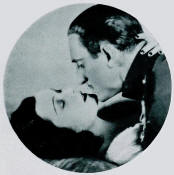A
Woman Commands
|
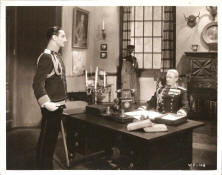 Alex learns he's being transferred. |
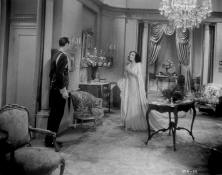 Alex visits Maria Draga |
Meanwhile, the Prime Minister is trying to convince the King about the benefits of marriage to Princess Helena. The King, however, is still smitten with Maria Draga, and not at all interested in the princess.
Maria is still in love with Alex, but he doesn't answer her notes. Despondent, she boards the train that will take her to her next singing engagement in Vienna. Before the train leaves, however, two of the king's guard board it and forcibly remove Maria from the train. Waiting in a carriage is the king; he insists on marrying Maria. The question is, Why does she agree to this? We know that she doesn't love the king. She still loves Alex, but Alex isn't speaking to her. Does she feel a relationship with Alex is hopeless? Is she trying to punish him for ignoring her? Is she trying to make him jealous?
Whatever her reason, she does marry the king, and his ministers lose their minds. They feel that the royal dynasty is threatened because the king married a cabaret singer.
During a military parade held in honor of the new queen, the soldiers would normally salute their queen, but Alex and his men refuse to do so. Alex won't even look at her. For this insult, Alex is arrested and sentenced to prison indefinitely. Eventually, Maria persuades the king to pardon Alex.
Fast forward a year; Prince Milan is born. But the king's subjects are still not happy with the king and queen. The army resolves to rid the country of King Alexander (whom they call a "buffoon"), his illegal queen and her son.
When the baby is being christened, a group of revolutionaries bomb the cathedral. Maria gives the baby to her maid, instructing her to take him to safety across the border. The king and queen retreat to the palace, but the revolutionaries storm the palace, and one of them shoots and kills the king. Alex is given the task of persuading Maria to sign abdication papers. Alex thinks that Maria won't listen to him; she hates him. But Colonel Strádimirovitsch tells Alex that Maria loves him, and she stripped herself of all her possessions to pay his gambling debts.
That knowledge changed everything for Alex. He who had glared with hatred at Maria since he first saw her come out of the king's boudoir now looks at her with love and compassion. Eventually Maria is allowed to leave with Alex and live in exile.
|
A WOMAN COMMANDS MILDLY ENTERTAINING COMEDY DRAMA WITH POLA NEGRI SCORING IN HER TALKER DEBUT Story of this one starts off in a comedy vein, then switches to drama. It's not particularly new and generally fails to sustain interest. Miss Negri, appearing in her first talker made in this country, in glamorous and expert in a part which does not afford her the best opportunities. Plot concerns a cafe entertainer who is more or less forced to marry the king of a small European country. Her former lover, a captain in the king's army, stirs up a revolution and the government falls, with the king being killed. Queen agrees to relinquish her right to throne but refuses to declare her child illegitimate as ordered by the revolutionists. She is sentenced to be shot but at the last moment the revolutionists change their minds and let the queen go into exile with her captain. The dialogue is bright but frequently there's too much of it. Roland Young and Basil Rathbone give Miss Negri excellent support, especially the former. Direction, okay. Photography, fine. —The Film Daily, January 31, 1932 |
The plot of A Woman Commands is based on the true story of Mara Draga Mashin, who served as the Queen of Serbia from 1900 to 1903, and her husband, King Alexander I, who ruled Serbia from 1876 to 1903.
She had been a lady-in-waiting to Alexander's mother. Though she was not a cabaret singer, she was considered inappropriate to be queen. For several years, she had been Alexander's mistress. Their marriage created a political scandal, and they faced overwhelming opposition. The people viewed the king as a besotted fool in the power of a wicked woman. In 1903 the couple was executed by a group of military officers.
The real Madame Draga didn't have a son, but the former king (her husband's father) was named Milan, the same name used for Maria's son in A Woman Commands.
An Austrian silent film called Queen Draga (1920) was also based on the story of the Serbian king and queen who were assassinated.
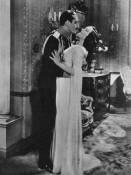 Basil Rathbone and Pola Negri |
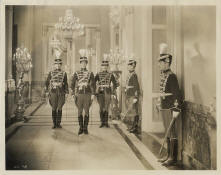 The captain of the guard |
The studio spared no expense in this lavish period production which, executives hoped, would make a talking star of a valuable silent-screen property. A Woman Commands was Negri's first talking picture. The film was well chosen; Negri's heavy accent and rather guttural contralto delivery were viewed as assets rather than liabilities.
The budget for the film was $415,000 ; Box Office earnings were only $212,000. According to RKO records, the film lost $265,000. (source: Richard Jewel, "RKO Film Grosses: 1931-1951," Historical Journal of Film Radio and Television, Vol. 14, No. 1, 1994)
Pola Negri and Basil Rathbone were both present at the Mayfair for the New York City premiere of A Woman Commands on January 28, 1932. Many famous luminaries, including New York City mayor Jimmy Walker attended the premiere.
|
A WOMAN COMMANDS First camera, Hal Mohr; second cameras, William Skall, Milton Krusner; assistant, Robert Surtees, Clarence Slifer; stills, Emmett Schoenbaum; sound, Earl Wolcott. As if she never had been away from the screen, Pola Negri comes back to us in "A Woman Commands" for Pathe. She comes back to us at the zenith of her powers as an actress of tense roles, as the interpreter of women of importance and position, as one who when in the guise of a variety artist flouts a king does so with entire conviction to the beholder, and one who when she is married to the king easily looks the queen. And in the several years hiatus in her screen work the player has undergone no experiences that caused her to lose any of the finesse that always has marked her love passages nor is there any discoverable diminution in the enthusiasm with which she clings in the clinches. The picture that marks her return to the world screen was shown for preview in the week before Christmas at a large theatre, the Ritz on Wilshire. The film still was in a fluid state, subject to further cutting as might be determined following audience reaction. It is unlikely much will be done to it, with the possible exception of quickening the movement in the closing sequence. The production as a whole is of magnitude, one that will reflect credit on every person associated with its making. Behind the screen these include Harry Joe Brown, associate producer, and Paul L. Stein, director. Horace Jackson adapted the story of Thilde Foster. Carroll Clark was art director. Then after these and others had done their best Hal Mohr, in charge of the cameras, put it on the screen. And how! The picture attracts in spite of its being around a two-bit European kingdom, one of the hardest backgrounds in which to establish illusion. Miss Negri is a care entertainer in love with Alex, captain of the guard, who is shifted to a foreign post. When the king sees her he falls in love at sight. The public baptism of the son develops into a successful revolution, the king is deposed and the woman is sentenced to death. Roland Young is the king who takes his job lightly and for the multitude most entertainingly. Basil Rathbone is the very serious captain of the guard. H. B. Warner is the colonel of the guard and brings distinction to the part. Anthony Bushell has a bit as the aid of the colonel. Reginald Owen is the prime minister and Frank Reicher is the general. The picture is notable for its staging, both in structures and in costuming, and in these respects we well as in others is a delight to the eye. All in all, "A Woman Commands" is an auspicious subject in which to mark the return of a player to the screen. —The International Photographer, January 1932 |
Laurence Olivier had originally been cast in the role as the young captain in love with Maria, but he contracted jaundice, forcing the studio to replace him. Basil Rathbone was selected for the part. According to the January 1932 issue of Silver Screen, Rathbone left New York immediately for Hollywood, learned his part on the way out, and went from the train station direct to the studios to start rehearsals as soon as he arrived.
Pola Negri felt Basil Rathbone was the wrong type to play a dashing lover—too stiff and unromantic. Of Rathbone, she wrote in her autobiography, "As an actor I suspected Basil Rathbone might be a little stiff and unromantic for the role, but he made a test that was surprisingly good."
Contemporary critics described Rathbone's performance as stiff, but I don't think he was stiff at all. In the first twenty minutes of the film, we see him agonize over losing at the roulette table, and then make passionate love to Maria Draga. Again, there are moving, passionate scenes at the end of the film.
Rathbone's wife Ouida and Pola Negri were old friends. Ouida's first husband George Fitzmaurice was Pola's first Hollywood director.
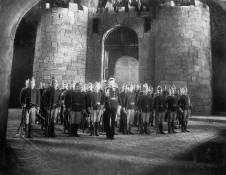 |
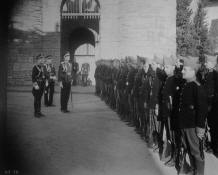 |
Pola Negri had worked with Director Paul Stein before; he had directed one of her first silent films in Berlin.
Critics praised Pola Negri's singing. Personally, I didn't care for it. She also whistled and hummed, which just made it worse.
According to Turner Classic Movies, an alternate ending had been planned. "A plot synopsis deposited with the copyright records describes an ending different from that of the filmed conclusion. According to the synopsis, after being captured, 'Maria' agrees to participate in a dangerous escape attempt devised by 'Alex,' but then sacrifices her own life so that he will not be killed." (http://www.tcm.com/tcmdb/title/96118/A-Woman-Commands/notes.html)
Thanks to archive.org, we can watch A Woman Commands for free! The quality is not great, but at least we have the opportunity to see the film:
See Page Two for more reviews of the film. See Page Three for pictures of posters, lobby cards and promo photos.
.
|
.







